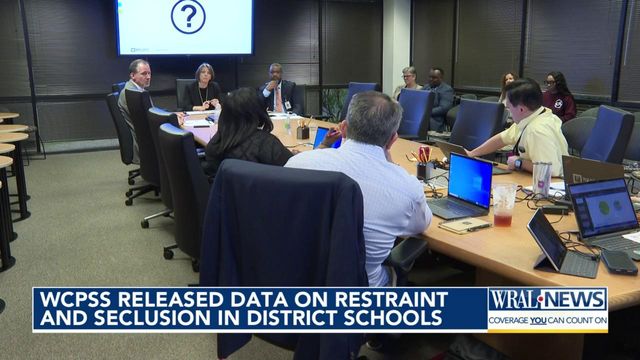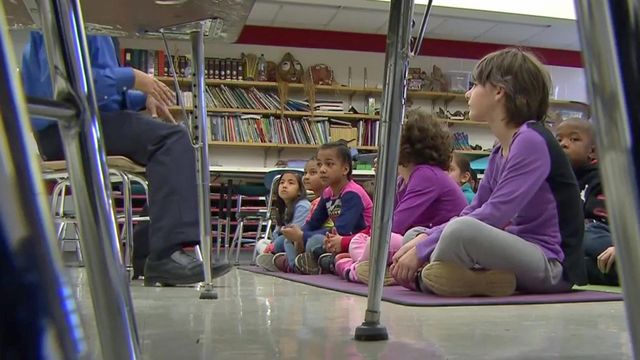More Wake teachers should be trained on behavior de-escalation, school board members say
The Wake County Schools Student Achievement Committee heard a presentation on restraint and seclusion incidents in the district -- a presentation required by a settlement with a family last August over a student's repeated seclusion in a closet.
Posted — UpdatedMore Wake teachers should be trained on behavior de-escalation, school board members told district officials Tuesday.
Currently, only limited teams at each school receive training from Crisis Prevention and Intervention, and other guidance has been geared more toward special education personnel, district officials told a committee Tuesday.
"How can we expect our staff to support students if they’re not trained?" Board Member Toshiba Rice said. "To me it doesn’t seem fair."
The school system and the board aren't proposing major changes, but officials have said they are expanding guidance on reporting incidents more accurately and have already made progress doing so.
Jill McKenna, district assistant superintendent over special education services, said officials recognize the need for more training for staff who work with non-special education students. The district has more teams meeting on this issue now and is also working on provide real-time, school-level data on incidents to every principal. Currently, principals have to request their school's data from the district.
"We are committed to clear and accurate reporting… and reduction of restraint and seclusion incidents, McKenna said.
So far this school year, there have been more than 600 incidents of restraint and nearly 200 incidents of seclusion against 240 students – that’s the latest data through December. A district presentation totaled the incidents at 864 but at least a few of those are double-counts of the same incident, just reported to different oversight agencies.
Of those 240 students, 88% were students with disabilities and 44% were Black, even though less than 13% of district students have a disability and just more than 20% of district students are Black.
Under state law, students are allowed to be restrained or secluded to prevent injury, fighting or property destruction – and only as a last resort. Schools cannot use restraint or seclusion merely as a disciplinary measure. Seclusion is different from a "timeout"; it means a student has been placed in an enclosed space, alone, and prevented from leaving.
The Wake County Public School System has been sued over how it secludes students in the past and has been ordered to report the incidents accurately after previously reporting no incidents at the federal level.
That settlement requires a semi-annual presentation to the school board on the use of restraint and seclusion in the Wake County Public School System.
Tuesday's meeting was the first time that the board received that presentation and discussed restraint and seclusion since that lawsuit.
Jocelyn Pease, the mother of the child who was restrained in the lawsuit, attended Tuesday's meeting, even though her daughter now goes to a new school outside of the system.
She was disappointed that board members didn't seem like they wanted to move away from secluding children or restraining them. The board can ban seclusion if members want to, she said. State law allows seclusion but doesn't require it, and several states have banned seclusion.
"I just wish that the overall attitude towards restraint and seclusion had changed," Pease said. "I feel like that has not changed at all, and that's very disappointing to me."
Her daughter's seclusion at her elementary school made her daughter scared to go to school for a long time, Pease said. Now that she's not secluded at her new school, she feels much more positively about going.
Seclusion, rather than a timeout, doesn't help children who struggle to regulate their own behavior or emotions, Pease said. It only frustrated her daughter more.
The training some Wake staff receive includes training on what to do after the use of restraint or seclusion, to prevent having to use it again, McKenna said.
But having more people trained on de-escalation would be critical, Committee Chairman Tyler Swanson said. Swanson is a former special education teacher.
"Oftentimes adults can... trigger some of these behaviors," he said.
Rice asked the district to look at how much all educators know about each child's Individualized Education Program -- a framework students with disabilities have for ensuring they have accommodations for their disability that will allow them to fully access their education.
Rice also asked that teachers know when certain behaviors should prompt certain responses.
"What I would really love to see across the board is for the protection of our students and for the protection of our staff, they should be empowered to know how best to address our students," Rice said.
Students may respond better if the person trying to de-escalate their behavior is a familiar face, rather than some other staff member who happens to have the Crisis Prevention and Intervention training, Board Member Wing Ng said.
"I want all of our teachers to have that familiarity of how to do some of the basics," Ng said.
• Credits
Copyright 2024 by Capitol Broadcasting Company. All rights reserved. This material may not be published, broadcast, rewritten or redistributed.





